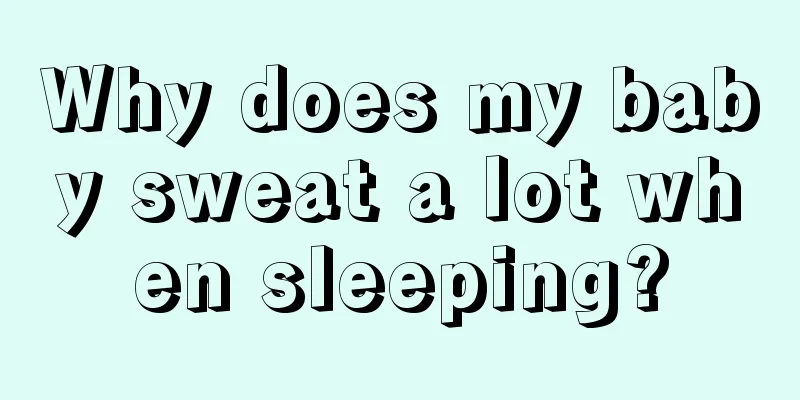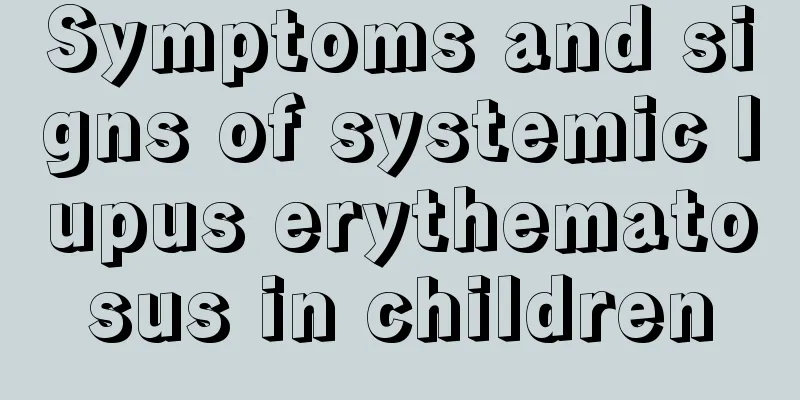Why does my baby sweat a lot when sleeping?

|
We parents will have this feeling when taking care of our children, because most parents will find that their babies sweat profusely when they sleep. So why do babies sweat profusely when they sleep? I believe some parents will worry about this. So is this situation physiological or pathological? The following content will introduce you to this aspect, and I hope it will be helpful to all parents. 1. Physiological sweating and its solutions. For normal children, parents do not need to worry even if they sweat too much, because children's sweat glands are more developed. The secretion of sweat glands is controlled by the autonomic nervous system (vagus nerve). After a child falls asleep, the vagus nerve becomes excited, causing excessive sweating. Sweating usually occurs mostly on the head and face, but it will subside within one or two hours after sleeping. At this time, you can use a dry towel to wipe off the sweat in time; change underwear frequently to prevent catching a cold due to excessive sweating; let your child take a bath frequently, and expose the bedding or sleeping bags to the sun frequently to keep them dry, and sterilize them at the same time. Infants and young children have an active metabolism and are active and lively. Some of them cannot rest even after going to bed at night, so they may sweat on their heads after falling asleep. The so-called physiological hyperhidrosis refers to sweating during sleep when the child is well-developed, healthy, and has no disease. Parents are often accustomed to deciding the best environmental temperature for their children based on their own subjective feelings, and like to cover their babies with more blankets and keep them tightly covered. Because children's brain and nervous system are not yet fully developed and they are in the growth and development period, their body metabolism is very active. Coupled with the stimulation of overheating, they can only regulate normal body temperature by sweating to evaporate the heat in the body. In addition, drinking milk, malted milk or eating chocolate before going to bed can also cause sweating in children. Some parents give their children milk, malted milk, etc. before they go to sleep. After the child falls asleep, the body produces a large amount of heat, which is mainly dissipated through sweating through the skin. In addition, too high room temperature or excessive warmth can also cause children to sweat while sleeping, which are all physiological sweating. 2. Pathological sweating and its solutions. Pathological sweating occurs when the child is in a quiet state, such as sweating caused by rickets, which manifests as obvious sweating on the child's head in the first half of the night after falling asleep. Because the pillow is irritated by sweat, babies often shake their heads and rub against the pillow when they sleep, resulting in sparse hair and loss of hair on the pillow, forming typical annular hair loss on the pillow, which is medically known as "occipital baldness". It is an early manifestation of rickets in infants. As long as vitamin D and calcium are supplemented in time, rickets can be controlled and sweating will stop by itself. If a child sweats not only in the first half of the night but also in the second half of the night and before dawn, it is usually a sign of illness, the most common of which is tuberculosis. Tuberculosis also has other symptoms, such as low fever, fatigue, loss of appetite, flushed cheeks, etc. Children with tuberculosis tend to sweat easily during daytime activities, which is called spontaneous sweating, and sweating at night is called night sweats. If you suspect your child is infected with tuberculosis, a lung X-ray or a tuberculin test should be done for timely diagnosis and treatment. Children with heat accumulation in the spleen and stomach may have a brisk or reduced appetite, good spirits, constipation, and frequent bowel movements. Although they are thin, they do not feel tired and they play all day long. The principle of treatment is to clear away heat and promote bowel movements to expel the heat. Children with weak constitutions often sweat in patches on their head, chest, and back when they are active during the day or after falling asleep at night. It is often caused by malnutrition due to improper feeding or poor digestion and absorption. In terms of nursing, attention should be paid to adjusting feeding methods, promoting children's appetite, and increasing the intake of protein, fat and sugar. If necessary, traditional Chinese medicine can be used to regulate spleen and stomach disharmony. Through the above introduction to why babies sweat profusely when sleeping, everyone must have a clear understanding. Parents can carefully observe their children's sweating to determine whether their children are sweating physiologically or pathologically. If you feel something is wrong, you should take your children to see a doctor in time for timely conditioning and treatment. |
<<: Why does my child sweat a lot when sleeping?
>>: What to do if children have brain hypoxia
Recommend
True myopia and pseudomyopia
After the appearance of true myopia and false myo...
Is the baby's rhinitis serious?
The baby is a piece of flesh that falls from the ...
What should I do if my baby has repeated fever and diarrhea?
For infants and young children, any kind of physi...
Is it really good for babies to swim every day?
When summer comes, parents like to take their bab...
Is it vitiligo if there are white spots on the child's belly?
Many parents will find some white spots on their ...
How to perform massage for children’s cough? Introducing professional methods to you
When a child has a cough, massage treatment can b...
Black vertical lines on children's nails
During the growth of children, parents must pay a...
What causes girls to have body heat?
There are many reasons that may cause people to h...
How many days will it take for baby's allergy to heal?
After the symptoms of allergies appear, many peop...
When should the neonatal dressing be removed?
When the fetus is in the mother's body, it is...
What are some tips for treating baby’s runny nose?
When the weather changes, children are prone to c...
What to do if your child sucks his lips
Many babies bite their lips, and some even bite t...
How to correct hunchback in teenagers
Hunchback has a great impact on your physical bea...
What should I do if my 10-month-old child is constipated?
Many Chinese families choose to wean their childr...
What are the consequences of having only one kidney in a child?
After becoming pregnant, women pay special attent...









